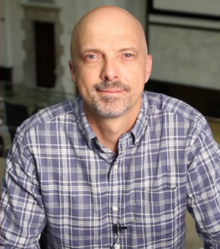| Carl Weems | |
|---|---|
 | |
| Professor and Chair at Iowa State University | |
Carl Weems is a Professor and Chair of the Department of Human Development and Family Studies at Iowa State University. Previously, he was a professor at the University of New Orleans.
Education
Weems received his bachelor's degree in psychology from Florida State University, his master's degree in experimental psychology from Hollins University, his doctoral degree in lifespan developmental psychology from Florida International University, and he completed post-doctoral study at Stanford University.
Scholarly and scientific career
Weems is known for his basic and translational research in developmental psychology. He has authored and co-authored over 160 peer-reviewed journal articles and a book titled "The Neuroscience of Pediatric PTSD".
Weems is the principal investigator of the main ISU Child Welfare Research and Training Project grants (CWRTP). He is also the Co-Principal Investigator/Co-director of Enabling Sustainable Community Health through a Transdisciplinary Translational Research Network (UTURN). Since 2008 he has served as editor-in-chief of the Child and Youth Care Forum, a multidisciplinary, peer-reviewed academic journal.
Weems' scientific contributions include: researching and creating a model describing the effect of traumatic stress on amygdala development, proposing a network model of PTSD in childhood and adolescence, and providing a revised model of adverse childhood experiences called Traumatic and Adverse Childhood Experiences (TRACEs) integrating resilience and the neuroscience of PTSD. The revised model has generated scientific and community use as an alternative view of the effect of adverse childhood experiences. His empirical work has also led to a theory for understanding the developmental expression of anxiety disorders across childhood and adolescence through understanding the role of statistical suppressor effects. Additionally, he has contributed to intervention development and prevention programming for child and youth anxiety and PTSD.
Fellowship
Weems is a fellow of the American Psychological Association and Association for Psychological Science.
References
- ^ "Dr. Carl Weems | iae.education.uiowa.edu". iae.education.uiowa.edu. Retrieved 2023-09-20.
- "Education and Employment Information". orcid.org. Retrieved 2023-09-21.
- Carrion, Victor G.; Weems, Carl F. (2017-08-04). Neuroscience of Pediatric PTSD. Oxford University Press. ISBN 978-0-19-020196-8.
- "Child & Youth Care Forum Editors". Springer. Retrieved 2023-09-21.
- "Child & Youth Care Forum". Springer. Retrieved 2023-09-19.
- Weems, Carl F. (2017-12-01). "Severe stress and the development of the amygdala in youth: A theory and its statistical implications". Developmental Review. 46: 44–53. doi:10.1016/j.dr.2017.08.001. ISSN 0273-2297.
- Weems, Carl F.; Russell, Justin D.; Neill, Erin L.; McCurdy, Bethany H. (April 2019). "Annual Research Review: Pediatric posttraumatic stress disorder from a neurodevelopmental network perspective". Journal of Child Psychology and Psychiatry. 60 (4): 395–408. doi:10.1111/jcpp.12996. ISSN 0021-9630. PMID 30357832. S2CID 53031499.
- "American Psychologist". psycnet.apa.org. Retrieved 2023-09-19.
- "Revised ACES Pyramid" (PDF).
- Rodríguez, Dr Gabriela Sadruní (2021-06-28). "Most People Have Adverse Childhood Experiences (ACEs): Here's Why We Should Care". The Psychology Group Fort Lauderdale. Retrieved 2023-09-20.
- Weems, Carl F. (2008-12-01). "Developmental trajectories of childhood anxiety: Identifying continuity and change in anxious emotion". Developmental Review. 28 (4): 488–502. doi:10.1016/j.dr.2008.01.001. ISSN 0273-2297.
- Weems, Carl F. (2022-10-20). "Disasters like Hurricane Ian can affect academic performance for years to come". The Conversation. Retrieved 2023-09-19.
- "APA initial and current fellows". www.apa.org. Retrieved 2023-09-21.
- O'Brien, Jill (2018-09-18). "Human Development and Family Studies chair Carl Weems named APS fellow". Department of Human Development and Family Studies. Retrieved 2023-09-21.